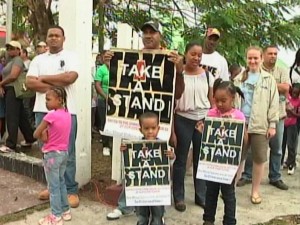Belize Continues to Deny Fundamental Human Rights of Sexual Minorities

A number of Latin American countries have long struggled to administer justice fairly and efficiently; increasingly, in recent years this has been in regard to gay rights. Even though most of the region’s constitutions guarantee an array of personal rights, large gaps have existed between what is promised and the actual redress delivered by a given nation’s judicial system. Indeed, the region’s constitutions chronically have proven to be insufficient to protect the rights of socially and politically disadvantaged groups. However, in the case of Belize, and in light of the blatant legal discrimination sanctioned by the notorious Section 53 of the Belize Criminal Code, this enshrined bigotry recently has come under intense scrutiny as the result of a pending court case. However, the outlook for its elimination appears bleak in a country that constitutionally labels itself as a “Christian” state and one that continues to identify both socially and politically with the Church.
The United Belize Advocacy Movement (UNIBAM) filed the high-profile court case against the Attorney General and the Government of Belize aimed at overturning the provisions of Section 53 that outlaw “carnal intercourse against the order of nature with any person or animal.” Their argument is that the law discriminates against consenting partners, and that their individual rights to privacy are being violated. However, the Belize Council of Churches and Evangelical Association of Churches, along with the Belizean Government, argue that the elimination of Section 53 would spur further laws advocating gay rights. That is, the long-held, anti-discriminatory practices protected by law would be uprooted, paving the way for a litany of more rights being afforded to what had been transformed into a marginalized group. Of course, the possibility of this kind of sudden shift appears unlikely and is being used as a mere rhetorical tool to gain support against altering Section 53.
This very debate is one that has permeated the Americas in recent years, but Belize remains the only country in Central America that outright prohibits male homosexual activity. There is no country in Central America that recognizes same-sex marriage, but all countries, except Belize, recognize the legality of same-sex activity under various legal provisions, overwhelmingly through advocating individual privacy. Nevertheless, in 2003, Belize enacted legislation that imposed a possible ten-year prison sentence on males convicted of such activity, as outlined by Section 53 of the Criminal Code. In addition, in 2011, the United Nations successfully pushed through a measure denouncing discrimination on the basis of sexual orientation with Belize remaining the only nation in the region that did not sign the resulting document.
In fact, Belize appears far from accepting any measure that affords male homosexuals even an inkling of hope for a more fair system. Even more damning is the judicial system—one based on civil law rather than common law—which is not fully equipped to defend individual and human rights in the country. Consequently, this matter may have to wait for a deficient political system to eventually accept responsibility. Not surprisingly, to this date, no major political parties have supported either the overturning, the amending, or the elimination of Section 53 of the Criminal Code. In fact, Dean Barrow, the current Prime minister of Belize, recently observed:
I would limit myself to saying that the government as a government has taken the position that it needs to argue for the constitutionality of the law that is in place that’s being challenged and so I would not go beyond that official position. I am not prepared to comment on my own physiological conviction or lack thereof. That is the official position of the government. This is one time when it might be wise for me to say nothing more.
The Prime Minister continued his remarks by condemning President Obama’s recent critique of nations that continue to persecute homosexuals. He argued that this issue is one for Belize to deal with and if President Obama wishes to punish states by removing foreign aid for continuing such practice, then “they will have to cut off their aid”. However, the U.S. is not likely to enforce the suspension of this foreign aid stipulation because Belize is critical to the implementation of U.S. drug policy.
The issue of fundamental human rights that should be afforded to sexual minorities is snared by a completely independent judiciary that by its nature is not designed to advance individual rights. Nonetheless, the privacy argument under which the lawsuit has been filed allows the Belizean Supreme Court to intercede, in a plenary manner, by expanding support for civil and human rights, and improving the lives of people both inside and perhaps even outside the homosexual community.
The struggle remains, but Belize, and the judiciary, have the ability to act in the name of privacy, and at least rule that the consensual activity should not be criminalized. If the judges act first in a decisive manner in this regard, then the possibility of progressive politicians later advancing the cause in the public arena greatly increases. However, if the witch-hunt laws that enable imprisonment and arrest remain in effect, the cause will continue to be suppressed, and human rights will continue to be denied, to the diminishment of the entire community.
Belize, indeed, is at a crossroads, and the future remains rather doubtful. Libertarians would argue that it is time for the judges to act and address a fundamental human rights issue by courageously defending minorities. Belizeans deserve such magnanimity and generosity of spirit, at the very least.
*The case will be tried on January 30, 2012.

